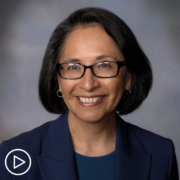Dr. Gabriela Hobbs: Why Is It Important for You to Empower MPN Patients?
Dr. Gabriela Hobbs: Why Is It Important for You to Empower MPN Patients? from Patient Empowerment Network on Vimeo.
What are some ways that can myeloproliferative neoplasm (MPN) care providers can help empower their patients? MPN expert Dr. Gabriela Hobbs from Dana-Farber/Harvard Cancer Center shares her perspective of how she educates her patients. Dr. Hobbs explains her methods of empowering all her patients in their care – whether they’re newly diagnosed, needing long-term MPN care, or going on to seek care from other clinicians.
See More from Empowering Providers to Empower Patients (EPEP)
Related Resources:

|

|

Dr. Ana Maria Lopez Why Is It Important for You to Empower Patients |
Transcript:
Gabriela Hobbs, MD:
I think that empowering patients is really important in developing an excellent longitudinal relationship with an MPN patient. And the way that I like to empower my patients is through education. And that starts with the first meeting with the patient when they’re recently diagnosed, or maybe they’re seeking you out for another opinion because maybe something is going not well with their disease.
And so that first visit, I really like to spend a lot of time educating about what MPNs are, the different types, the things that we worry about, the possibility of disease progression, and then spending a lot of time talking about the different treatment options that exist. As well as spending a lot of time talking about how patients can maximize their quality of life with both pharmacologic interventions as well as lifestyle modification. And so education really is at the center of empowerment for patients.
And I think that that gives them a lot of control over their disease and prepares them for additional visits with me or with other clinicians if they’re seeking other care from other clinicians as well, especially those patients that maybe travel from far away. And so education during that visit is important, but also talking to patients about how to prepare for additional visits. So I talk to patients a lot about taking track of their symptoms, keeping track of how they’re feeling, how they feel with the medication, with perhaps a change in medication, how they feel like their symptoms are changing over time. Talking to them about the MPN symptom assessment form, and making sure that they can utilize that form to keep track of how they feel.
And then also asking questions…If they don’t ask questions during the encounter, make sure that they write down those questions in a notebook so that when they do go to see their clinician at the next appointment, they can make the most of that encounter by knowing that they’re going into that encounter, prepared with questions and able to summarize the way that they’ve been feeling over the last couple of weeks or months since their last appointment. So education is really always at the center of empowerment.



